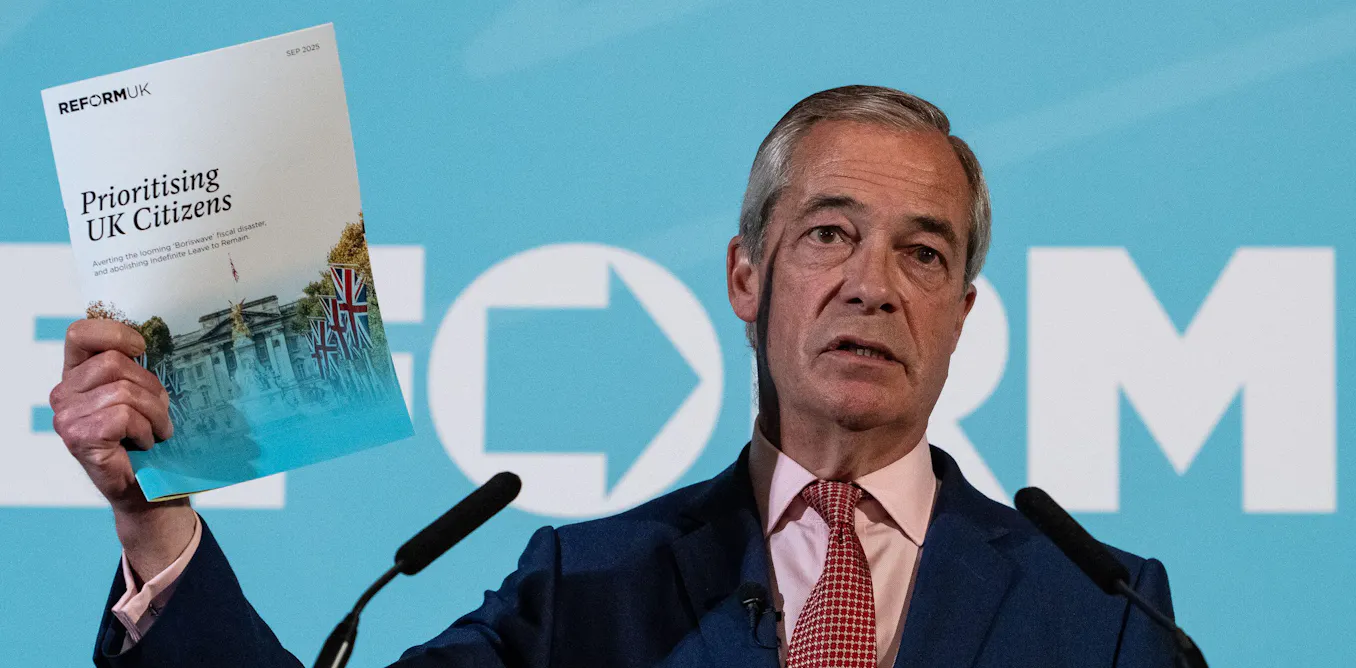Nigel Farage’s pledge to end indefinite leave could hurt the economy even before an election
By Lecturer in Work and Organisations,Tom Montgomery,University of Stirling
Copyright theconversation

Nigel Farage’s proposal to abolish indefinite leave to remain is a shifting of the goalposts for those who have already come to the UK legally and settled.
Framing issues of migration as a crisis has been beneficial for Farage and other British politicians as a political strategy. However, on this occasion there are early indications that these proposals may provoke a more negative reaction from the British public.
The idea that even those already granted leave to remain would have to reapply creates insecurity for thousands of people who have come to call the UK home, which speaks to some of the human costs of such proposals.
We should also consider the potential implications for the economy. Reform claims billions could be saved by ending the right to apply for permanent residency in the UK – a claim that was called into question within days.
This indicates a pressing need for scrutiny of the economic impact a Reform government would have, particularly given that the party leading in polls.
Polls are not just indicators of who may next occupy 10 Downing Street. They also send signals to key actors in the economy about the country’s potential future direction of travel. And these signals matter. To understand how, we can turn our attention to the questions that an end to indefinite leave to remain may pose for the UK labour market.
There is already a problem with skills investment in the UK. Decisions to invest in skills and training often require a commitment to long-term investment before the employer and the employee realise the benefits.
But what happens to such investment when employers are unsure if their staff may be forced to leave? This is particularly relevant for those key sectors where there is a greater reliance on migrant workers.
Then there is the issue of job creation. If an employer is currently deciding where to invest and create new jobs, one aspect they will consider is access to the skills they need.
We know that there are key areas where employers are concerned about skills shortages in the UK. Would the potential end of leave to remain make it riskier to invest in creating jobs in the UK? This is a question employers will already be asking.
And if you are a worker from another country with skills that are in high demand, would these proposals make the UK more, or less attractive as a destination to bring skills?
These economic implications lead us to a key political question: who did Reform consult before making this announcement?
Reform has consistently sought to position itself as on the side of British business. Did they speak to the Confederation of British Industry about whether scrapping indefinite leave to remain would be a good idea? The Federation of Small Businesses? Did they speak to industry federations in the care sector, the hospitality sector, the education sector, or the health sector, where employers rely upon migrant workers?
Farage has also been keen to present himself as standing up for British workers and has in the past year been seeking to win support of grassroots union members. Did he consult any of the trade unions that represent millions of workers across the UK? Or did he consult trade union representatives in sectors that may be affected by these new proposals?
What type of consultation has informed these new proposals matters because it sends an important signal on the approach to governing that Farage intends to adopt should he become the next prime minister. Such signals are also likely to inform decisions made before the next election by employers and workers sustaining the UK economy.
Perhaps owing to the rapid rise of the Reform party and the dominance of two parties in government for generations, it has not received the same degree of scrutiny that previous “governments-in-waiting” have received. But given its dominance in the polls, careful consideration of the impact of its proposals is more necessary than ever.
If we look closer at these latest proposals, we see that they will create a more hostile and uncertain environment for those who have lived and worked in the UK for some years and those considering coming to the country. That may have already created risks for the UK economy.
Want more politics coverage from academic experts? Every week, we bring you informed analysis of developments in government and fact check the claims being made.Sign up for our weekly politics newsletter, delivered every Friday.



